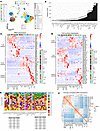Citation Information: JCI Insight. 2025;10(7):e183080. https://doi.org/10.1172/jci.insight.183080.
Abstract
The sentinel lymph node (SLN) is the first lymph node encountered by a metastatic cancer cell and serves as a predictor of poor prognosis, as cases with clinically occult SLN metastases are classified as stage III with elevated rates of recurrence and diminished overall survival. However, the dynamics of immune infiltrates in SLNs remain poorly characterized. Here, using an unbiased cellular indexing of transcriptomes and epitopes by sequencing technique, we profiled 97,777 cells from SLN tissues obtained from patients with stages I/II and III cutaneous melanoma. We described the transcriptional programs of a multitude of T, B, and myeloid cell subtypes in SLNs. Based on the proportions of cell types, we determined that SLN subtypes stratified along a naive → activated axis; patients with a “high activated” signature score appeared to be undergoing a robust melanoma antigen–driven adaptive immune response and, thus, could be responsive to immunotherapy. Additionally, we identified transcriptomic signatures of SLN-infiltrating dendritic cell subsets that compromise antitumor immune responses. Our analyses provide valuable insights into tumor-driven immune changes in the SLN tissue, offering a powerful tool for the informed design of immune therapies for patients with high-risk melanoma.
Authors
Eric Engelbrecht, Bryce F. Stamp, Lewis Chew, Omar Sadi Sarkar, Phillip Harter, Sabine J. Waigel, Eric C. Rouchka, Julia Chariker, Andrei Smolenkov, Jason Chesney, Kelly McMasters, Corey T. Watson, Kavitha Yaddanapudi
This file is in Adobe Acrobat (PDF) format. If you have not installed and configured the Adobe Acrobat Reader on your system.
Having trouble reading a PDF?
PDFs are designed to be printed out and read, but if you prefer to read them online, you may find it easier if you increase the view size to 125%.
Having trouble saving a PDF?
Many versions of the free Acrobat Reader do not allow Save. You must instead save the PDF from the JCI Online page you downloaded it from. PC users: Right-click on the Download link and choose the option that says something like "Save Link As...". Mac users should hold the mouse button down on the link to get these same options.
Having trouble printing a PDF?
- Try printing one page at a time or to a newer printer.
- Try saving the file to disk before printing rather than opening it "on the fly." This requires that you configure your browser to "Save" rather than "Launch Application" for the file type "application/pdf", and can usually be done in the "Helper Applications" options.
- Make sure you are using the latest version of Adobe's Acrobat Reader.




